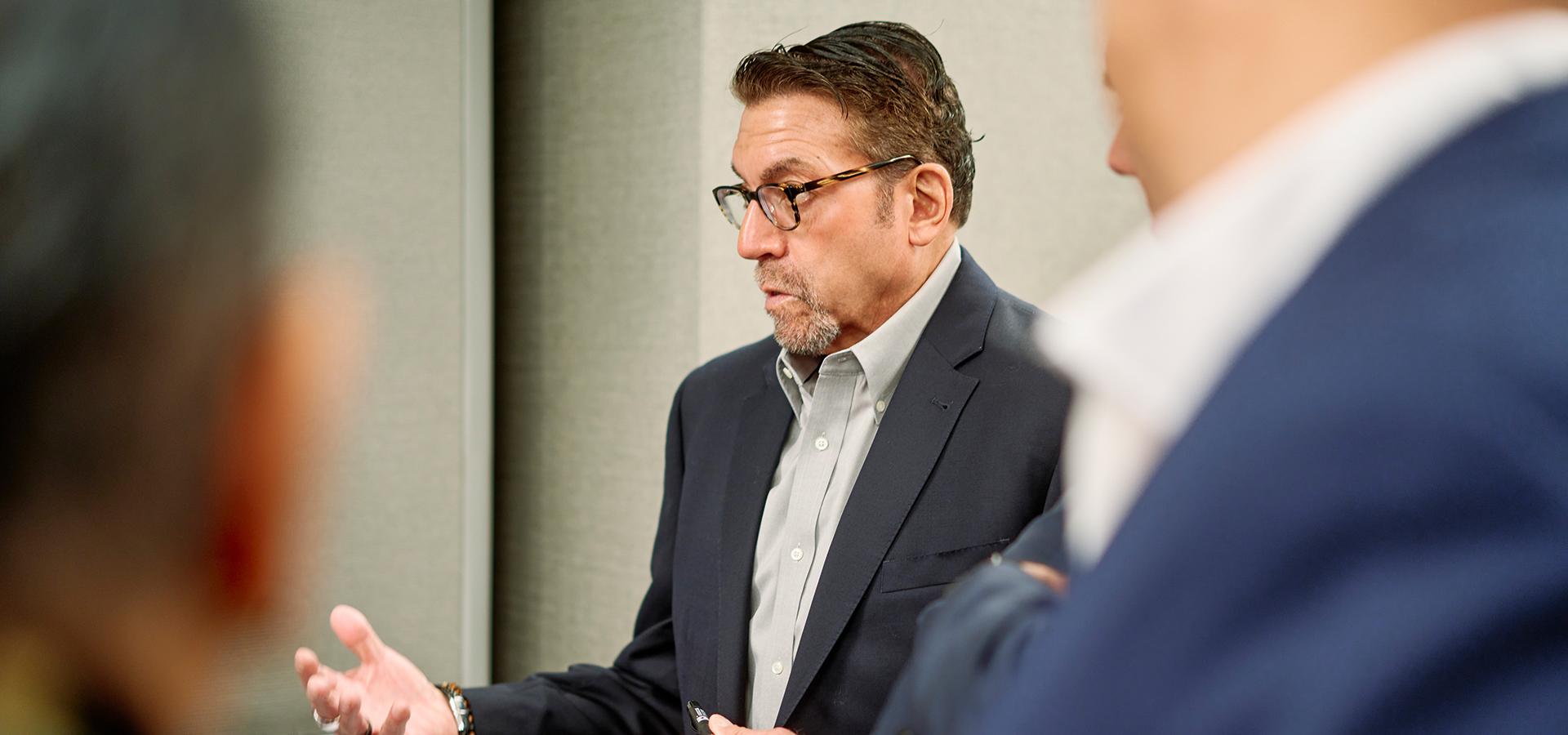Author
Subscribe to Newsletter
Related Posts
(Test) Service and Sacrifice of Military Members from a Command Team View
Author
Subscribe to Newsletter
Related Posts
Forum on Ethical Leadership
Author
Subscribe to Newsletter
Related Posts
Horizons Golf Classic
College News Roundup December 27, 2024 January 3, 2025
The Washington Post | Should Mega-Millions Jackpot Winners Take a Lump-Sum Payout or Annuity?
December 27, 2024
In this article, Wealth Management Certified Professional® (WMCP®) Program Director Michael Finke, PhD, CFP®, explains the benefits of annuities and structured settlements for individuals experiencing dramatic financial changes, like lottery winners.
Business Insider | Expect S&P 500 Returns to Be Flat Over Next 10 Years: Morgan Stanley
December 28, 2024
This article references an analysis done by WMCP® Program Director Michael Finke, PhD, CFP®, which illustrates the accuracy of the CAPE ratio in predicting returns.
The Wall Street Journal | Even Rich Retirees Fear Outliving Their Money
December 29, 2024
Consulting WMCP® Program Director Michael Finke, PhD, CFP®, this article discusses the common spending fears among retirees and how financial planning services can ease their worries.
Think Advisor | American College Launches Donor-Advised Fund Training Program
January 2 , 2025
This article spotlights The College’s Donor-Advised Fund (DAF) Professional Certificate and its inaugural event in Dallas, Texas coming April 2025.
Ambassadors Share Retirement Planning Insights at FinServe Summit

The expert panelists, Terrell Dinkins, ChFC®, RICP®, Ande Frazier CFP®, CLU®, ChFC®, RICP®, BFA™, ChSNC®, CDFA®, CEPA, CExP, Ryan Swenson, RICP®, and Irv Rosenzweig, CFP®, ChFC®, CLU®, CRPS®, AEP®, AIF®, shared their insights into the evolving landscape of retirement planning and how advisors can navigate its increasing complexity.
Overcoming Key Retirement Planning Challenges Clients Face
Manganaro kicked off the discussion by asking about the key challenges clients face when it comes to retirement planning. For Dinkins, a major issue is the difficulty many clients face in imagining what their lives might look like — financially and socially — after they leave the workforce. She emphasized how data can help overcome this by alleviating fears and showcasing potential outcomes. “Numbers don’t lie,” she said.
Swenson agreed about the value of data and highlighted the impact of using visualization tools such as financial planning software to communicate clearly with clients.
“A lot of people are visual learners,” he explained. “By leveraging planning software, we can plug in their goals, savings rates, or withdrawal rates, and create graphs that make retirement planning feel real and actionable.”
Frazier added a key challenge can be the overwhelming amount and complexity of information about retirement. She said advisors can help by striking a balance between sharing their expertise and actively listening to their clients.
“One of the things that we can do as advisors is to take all the knowledge that we have and ask better questions and then actually shut up and listen,” she said. “We need to give clients the opportunity to think through their answers. This is a complex conversation, and sometimes they need a beat to gather their thoughts and express their concerns.”
The Role of Professional Education
When Manganaro turned to the role advisors can play in helping clients achieve their retirement goals, panelists emphasized the value of professional designations in enabling them to deliver targeted and high-impact retirement planning services. Both Dinkins and Rosenzweig credited their designations with deepening their ability to address the nuanced challenges of retirement planning.
“The Retirement Income Certified Professional® (RICP®) Program helped me paint a better picture for clients, especially when it comes to the social aspects of retirement,” Dinkins said.
The panelists also noted that growing their understanding of specific products was helpful in building well-rounded retirement strategies. When it comes to selecting the right products for clients, Rosenzweig explained that advisors and clients are inundated with messaging that paints certain products, such as annuities or reverse mortgages, as “bad.”
To help clients, said Rosenzweig, “You must eliminate bias and remain objective.”
“You can’t do that until you have the product knowledge,” he said. “It’s one of the things that I enjoy seeing from The College when new products hit the market.”
Tax Planning: A Cornerstone of Strategy
Tax management also emerged as an essential element of comprehensive retirement planning.
Frazier emphasized the importance of creating “tax diversification” within retirement portfolios. “We want clients to have tax-free accounts, tax-deferred accounts, and regular accounts to engineer their income in retirement,” Frazier explained. “This can help them stay in a lower tax bracket and ensure their Medicare premiums don’t go up.”
She also noted that the tax treatment of different retirement accounts has become increasingly complicated.
“Let's face it: the rules around IRAs and distributions and inherited IRAs and so on have become so complex, and there's not a lot of clarity even in the IRS guidelines on some of it,” she said. “So, the more knowledge that we can have in that area, the better our service will be to our clients.”
Addressing the Emotional Aspects of Retirement
Finally, the panelists agreed that advisors should not overlook the emotional aspects of retirement planning. Rosenzweig noted that clients often don’t spend enough time on legacy and estate planning because they don’t want to face questions of their own mortality.
Frazier agreed, and said, “Legacy planning is about coming to terms with the fact that this is the last stage of their life. It's coming to terms with what they want to leave their family or organizations they care about. That's one of the reasons they're not doing a lot of planning, because they can't deal with some of the emotional questions and conversations they need to. We, as advisors, have to guide those conversations. And we have to remember that we're dealing with a whole person, not just a part of a person when we're talking about retirement.”
More From The College
- Meet Our FinServe Network
- Enroll in Our Retirement Income Certified Professional® (RICP®) Designation
- Learn About Our Tax Planning Certified Professional™ (TPCP™) Program
College News Roundup December 2024
RetireReady | Financial Literacy
December 2, 2024
Based on the findings in The College’s 2023 Retirement Income Literacy Study, this podcast episode dissects the importance of financial literacy and how Americans can enhance their retirement knowledge.
Investopedia | How To Maximize Social Security Benefits
December 3, 2024
Consulting with College Adjunct Instructor Arthur Prunier, RICP®, this article highlights key strategies that individuals approaching retirement can enact to make the most out of their benefits.
Yahoo Finance | "Last-Minute Tax Impacts" You Can Implement Today: Expert
December 3, 2024
Associate Professor of Business Planning and Tax Planning Certified Professional™ (TPCP™) Program Director Sophia Duffy, JD, CPA, AEP® shares tips on how to proactively plan for potential tax policy changes in the new year.
Financial Planning | Side Hustle Nation: How To Help Self-Employed Clients with IRS Rules
December 4, 2024
In this article, Associate Professor of Business Planning and TPCP™ Program Director Sophia Duffy, JD, CPA, AEP® discusses the intricacies of navigating income tax for self-employed clients.
TradeTalks | Potential Tax Legislation in 2025 and 2026 and What Investors and Financial Advisors Should Be Considering
December 5, 2024
Professor of Practice in Tax Planning Jeffrey Levine, CFP®, CPA/PFS, ChFC®, RICP®, CWS, AIF, BFA™, MSA, Associate Professor of Business Planning and TPCP™ Program Director Sophia Duffy, JD, CPA, AEP®, and Wealth Management Certified Professional® (WMCP®) Program Director Michael Finke, PhD, CFP® join TradeTalks host Jill Malandrino to talk tax legislation changes in the new year and how to plan long-term.
InvestmentNews | Introducing a New Tax Planning Certification for Advisors
December 5, 2024
Sophia Duffy, JD, CPA, AEP®, associate professor of business planning and TPCP™ Program director, sits down with InvestmentNews host Greg Greenburg to highlight how The College’s new Tax Planning Certified Professional™ (TPCP™) Program can strengthen advisors’ tax planning toolkits.
Financial Advisor | Index Funds Are Popular, But They're Not All Alike, Advisors Say
December 6, 2024
In this article, WMCP® Program Director Michael Finke, PhD, CFP® discusses the best way to utilize index funds and how recent research might push investors to reconsider their current strategies.
Church Executive | How To Vet a Financial Advisor
December 9, 2024
This article outlines what a client should look for in a financial advisor, including specialized financial and retirement planning through The College’s Chartered Financial Consultant® (ChFC®) and Retirement Income Certified Professional® (RICP®) designations.
ThinkAdvisor | Meet the 2024 Luminaries Winners
December 12, 2024
The College was honored as the recipient of the Luminaries Advisor Education Award for Thought Leadership and Education at the 2024 Luminaries Awards. Associate Vice President of Centers Strategy and Operations and Managing Director of the American College Center for Special Needs Joellen Meckley, JD, MHS, ChSNC® was one of many honorees as a Luminary with a Heart.
Fortunly | Finance Certifications to Boost Your Resume
December 15, 2024
This article lists the top certifications that individuals can pursue to enhance their career in financial services, including the College’s ChFC® program.
Yahoo Finance | Bitcoin Clears Another Record: Is Now the Time to Invest?
December 16, 2024
As the price of Bitcoin continues to skyrocket, WMCP® Program Director Michael Finke, PhD, CFP® warns against giving in to the fear of missing out and instead advises those looking to invest to look before they leap.
Gwinnett Daily Post | LAKO: Retirement Literacy Gap: Why Planning Is More Important Than Ever
December 18, 2024
In this article, columnist William Lako, CFP®, considers the implications of the College’s 2023 Retirement Income Literacy Study findings, looking specifically at the results involving investment literacy.
Global Banking & Finance Review | Guidance Based on Education & Collaboration: How Richard C. Peck Consulting and The Philanthropy Guy Empower Nonprofits
December 19, 2024
This article spotlights the philanthropy efforts of FinServe Network Ambassador Richard C. Peck, CFP®, ChFC®, CAP® , including the College’s Donor-Advised Funds (DAF) Professional Certificate program.
MSN | Reverse Mortgages: A Reliable Tool for Modern Retirement
December 20, 2024
College Adjunct Instructor of Retirement Income Don Graves, RICP®, debunks the misconceptions around reverse mortgages and summarizes the history of issues and reforms behind the retirement tool.
Author
Subscribe to Newsletter
Related Posts
2025 Conference of African American Financial Professionals
New Campaign to Elevate Financial Designations

KING OF PRUSSIA, PA – January 6, 2025 – To communicate the specialized expertise behind designations earned and maintained at the nation’s leading accredited institution for financial education, The American College of Financial Services has partnered with Big Com, a full-service marketing and advertising agency, to develop a consumer awareness campaign.
“Americans have complex and unique financial situations, and the financial life they want to live is just as complex and unique. While clients are mostly satisfied with the investment management and broad financial planning services they receive, research tells us that satisfaction erodes as specialized services are needed,” said George Nichols III, CAP®, president and CEO of The College. “Consumer confusion over the myriad of designations makes it difficult for them to discern a generalist from a specialist. To fulfill our mission to uplift the profession and benefit society, we must do more to share what our credentials mean, and amplify the designees who hold them.”
To achieve this goal, Big Com and The College will spend the next eight months conducting research, talking with designees, assessing consumer sentiment, and executing a campaign that helps consumers cut through the confusion and better align their goals with a professional’s, or their team’s, expertise. Big Com will be on the ground at The College’s flagship educational experience, Horizons, in March to hear from designees about how they view their designations, how they discuss them with clients, and what matters most to them.
The campaign, set to launch to the public this fall, is one of several benefits available to College designees in good standing.
A webcast will be held in early 2025 to review all the new Professional Recertification Program (PRP) benefits introduced over the past 12 months and answer any questions about the campaign, including the re-designed website, www.YourAdvisorGuide.com, where clients can search for professionals who have the expertise they need.
“The profession has made significant strides in increasing professional competence, credibility, and trust since our founding nearly a century ago. Having baseline educational standards is important, as it is in any profession. Yet, as client needs have grown more complex, expectations are not always being met in retirement, estate, tax, philanthropy, and other areas. We believe an additional layer of understanding related to specialized knowledge and service offerings, similar to the specializations found in professions like medicine, will help clients have more clarity, greater confidence, and make well-informed decisions when it comes to selecting the right financial professional or team,” said Jared Trexler, senior vice president and chief marketing and chief strategy officer.
“Big Com has a distinguished track record of working with disruptors in various sectors. We are confident they can help us move the needle in raising awareness of how College designations set financial professionals apart—and the value proposition these committed pros can deliver to American families.”
###
ABOUT THE AMERICAN COLLEGE OF FINANCIAL SERVICES
Founded in 1927, The American College of Financial Services is the nation’s largest nonprofit educational institution devoted to financial services professionals. Holding the highest level of academic accreditation, The College has educated over 200,000 professionals across the United States through certificate, designation, and graduate degree programs. Its portfolio of applied knowledge also includes just-in-time learning and consumer financial education programs. The College’s faculty represents some of the foremost thought leaders in the financial services industry. Visit TheAmericanCollege.edu and connect with us on LinkedIn, Instagram, Facebook, and YouTube. Discover all the ways you can expand your opportunities with us.
ABOUT BIG COM
Big Com is a full-service marketing and advertising agency based in Birmingham, Alabama, dedicated to helping national brands connect with consumers. With a unique approach grounded in an earned media mindset, Big Com leverages its PR and creative advertising expertise to build meaningful, lasting relationships between brands and their audiences. For more information, visit www.bigcom.com.
Contacts:
Sarah Tremallo
908-967-0381 / Stremallo@jconnelly.com
Jared Trexler
610-526-1268/ jared.trexler@theamericancollege.edu
Ethics In Financial Services Insights
Unlock the Power of Trust with The Trust Certificate Program

The Trust Certificate Program equips financial services professionals with the tools needed to overcome these hurdles and develop skills to address future complexities as a resilient, effective leader. Through this program, you’ll become a trusted partner to financial advisors, identify and overcome barriers to trust, master client trust, and navigate industry trust-related challenges.
This program goes beyond theory, applying frameworks developed by the American College Cary M. Maguire Center for Ethics in Financial Services to help participants build deeper connections, address barriers to trust, and create trust-based relationships that drive long-term success.
Participants can choose between two course offerings:
Strategies for Building Trust: A Practice-Based Certificate Program TRST 101
- Live program designed for financial professionals, advisors, and leaders from various financial services institutions
- Program provides six hours of fully remote education, with CE credits
- Next Cohort: June 13, 20, 27, 11:00am-1:00pm EST
- Available for open enrollment via The College’s student enrollment portal
Advanced Strategies for Building Trust: A Practice-Based Certificate Program TRST 100
- Live program tailored for home office leaders at a single company
- Provides 10 hours of education, including a capstone project, with CE credits
- Delivered on-site, hybrid, or fully remote
- Delivery dates tailored to the company calendar
The Center for Ethics in Financial Services is dedicated to raising the level of ethical behavior in the financial services industry – this program is your best investment in a thriving and successful future! Enroll today and unlock the power of trust.
More from The College
- Learn more about the Center’s Trust Certificate Program including enrollment information.
- Access information on the Center’s research on trust's role in financial services.